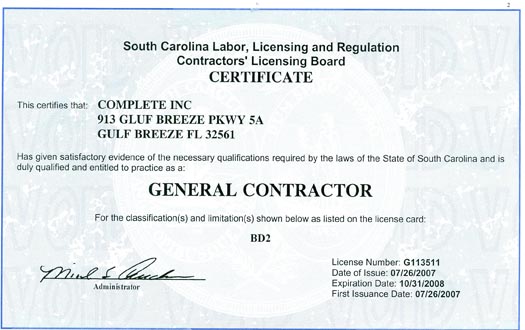General Contracting Licensing: Laws requiring general contractors to be licensed have existed since the 1800’s. The ICC (International Code Council) was founded to put in place a comprehensive national model of construction codes. The laws are intended to protect the public from the problems associated with bad construction, the results of which can include collapse and bodily injury; water intrusion and mold; to just bad esthetics. States vary on their commitment to occupant safety and each state enacts different legislation by jurisdiction.

Florida – General contractor license Florida – In the state of Florida, a contractor must be registered or certified to do construction work. You can get a “registered” contractor’s license at the local or county level, unless a certified license is required by the county where the work is to be performed. Contractors with a “certified” license are allowed to work anywhere in the state; however, they are required to register in the county where they are working. To qualify to take the examination for the Florida contractor’s license you must be at least 18 years old and also meet one of the following: A four-year construction-related degree and one year proven related experience; One year of experience as a foreman and not less than three years of credits for college-level courses; One year experience as a workman, one year proven experience as a foreman, and two years of credits for college-level courses; Two years experience as a workman, one year experience as a foreman, and one year of credits for any college-level courses; Four years experience as a workman or foreman of which at least one year must have been as a foreman; or Holding an active certified or registered Florida contractor’s license. To become a licensed certified contractor, an applicant must pass all parts of the exam; meet the education/experience requirements; obtain worker’s compensation coverage and demonstrate financial responsibility. If you have a trade license from another state, you may qualify for the trade exam if you can prove you obtained your license by passing an exam and that your existing out-of-state license required experience equal to what the Board requires. Other than this Florida, does not have any reciprocity or endorsement agreements. To find out more.

Georgia – Georgia contractors license – In 2004, the state of Georgia created the State Licensing Board for Residential and General Contractors to regulate individuals engaged in construction contracting. Applicants for licensure must pass a two-part examination; the first part covers the license field they are attempting to obtain and the second part focuses on business and law. The Board has the authority to adopt rules, set standards for licensure, adopt mandatory standards of professional conduct, and investigate and discipline unauthorized, negligent or incompetent practice for a general contractor license in GA. You can apply online for Residential Basic Individual License types only. For more information, visit http://sos.georgia.gov/plb/contractors/default.htm.

North Carolina – General contractor license NC – The state of North Carolina allows general contractors to work without having a license for construction projects under $30,000. To work as a general contractor on projects costing more than $30,000, one must get a license from the North Carolina Licensing Board for General Contractors. Specialty contractors [Electrical, Plumbing, HVAC and Fire Sprinkler Contractors] must be licensed. If you need more information from the NC Licensing Board for General Contractors.
South Carolina – South Carolina requires that anyone doing residential work costing over $200 must be licensed; for commercial projects, any job costing over $5000 must be performed by a licensed individual. South Carolina’s General Licensing Commission can grant you a South Carolina contractors license without taking the exam if you have a license from another state that has comparable requirements. A residential specialty contractor is an independent contractor, who is not a licensed residential builder. The specialty contractor contracts with a licensed residential builder, general contractor or individual property owner to do construction work, repairs or improvements requiring special skills and involving the use of specialized construction trades or craft, when the undertakings exceed $200. If a specialty contractor performs work exceeding $5,000, the specialty contractor must obtain a surety bond in the amount of $5,000. For more information, go to www.llr.state.sc.us.
Texas – Texas contractor license – There is no requirement for a general contractor to be licensed in the state of Texas. Only specialty contractors [HVAC, Fire Sprinkler Systems, Plumbing, Electricians and Well Drilling/Pump Installation Specialists] need to be licensed. Homebuilders are not required to be licensed; therefore, it is advisable to check with your local municipality or county throughout the state outside of municipal jurisdiction, for local requirements. For more information on Texas’ licensing laws, please visit their website at https://www.tdlr.texas.gov/. We hope that after the costs associated with Hurricane Ike are understood, and when the shoddy work of some is discovered, that Texas will enact general contracting licensing laws. As we all know that have worked out here, Texans do not like to be hemmed in, as they say “Don’t Mess With Texas.”

It is apparent that the requirements for licensing varies from state to state. Optimally, states throughout the country would adopt practices of regulation for the construction industry. With the implementation of the ICC (International Code Council), a basis for regulation has been established. As technology develops and construction techniques improve, a strong base of regulation will only provide better protection for the homeowner and commercial property investor.
For more information, click on the International Code Council icon; another useful resource for a variety of building code information
This information should not be substituted for professional legal advice; consult with your lawyer for legal advice and ask your insurance professional to discuss the details of your policy and insurance needs.
